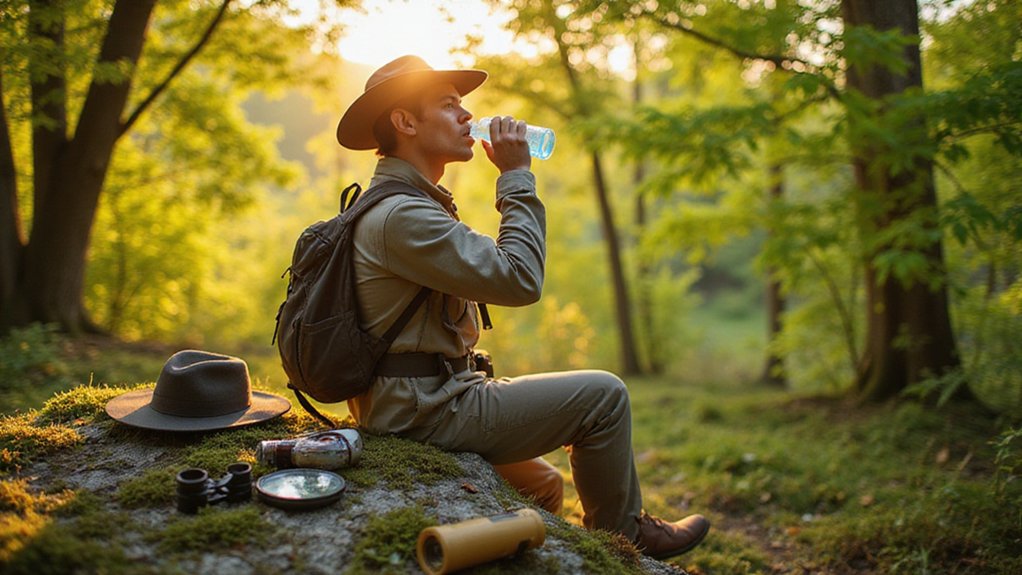When you’re out hunting in hot weather, staying safe is essential. Heat can quickly lead to exhaustion or more serious issues if you’re not careful. You need to know how to prepare, what gear to bring, and how to manage hydration. There are also specific signs of heat-related illnesses you should watch for. Understanding these factors can make all the difference in your hunting success. So, what should you keep in mind before heading out?
How to stay safe hunting in heat: Essential tips for outdoor enthusiasts
When you head out for a hunting trip in hot weather, it’s important to prioritize your safety.
Start by wearing lightweight, breathable clothing to keep cool while protecting your skin.
Stay hydrated; drink plenty of water before, during, and after your hunt.
Plan your outings during cooler parts of the day, like early morning or late evening.
Take regular breaks in shaded areas to rest and cool down.
Keep an eye on your body; if you feel dizzy or fatigued, it’s time to cool off.
Carry a first aid kit and know how to use it for emergencies.
Stay smart and safe!
What are the risks of hunting in hot weather?
Although hunting in hot weather can be enjoyable, it also poses significant risks that you shouldn’t overlook. High temperatures can lead to dehydration, heat exhaustion, and even heat stroke, which can be life-threatening.
Additionally, the heat can affect your judgment and physical abilities, making it harder to stay alert and focused.
- Dehydration can impair your performance and decision-making.
- Heat exhaustion may cause dizziness, weakness, and rapid heartbeat.
- Increased insect activity can lead to bites and potential infections.
Stay aware of these risks to guarantee a safe and successful hunting experience in the heat.
How can you prepare for a hot weather hunting trip?
How can you guarantee your safety and success during a hot weather hunting trip? Start by checking the weather forecast and planning your outing for cooler times of the day, like early morning or late evening.
Stay hydrated; drink water before you even feel thirsty. Choose lightweight, breathable clothing that protects against sun exposure.
Familiarize yourself with the area, noting spots where shade and water sources are available. Always inform someone about your plans and expected return time.
Finally, listen to your body—if you start feeling dizzy or fatigued, find a cool place to rest and recover.
What essential gear should you bring for hunting in the heat?
Staying comfortable and safe during a hot weather hunting trip hinges on having the right gear.
You’ll need items that help you beat the heat while remaining effective in the field. Here are three essentials to bring along:
- Lightweight, moisture-wicking clothing: This keeps you cool and dry.
- Wide-brimmed hat: Protects your face and neck from the sun.
- Cooling towel: Drape it around your neck for instant relief.
With these items, you’ll stay comfortable, focused, and ready for a successful hunt, no matter how high the temperatures rise.
What hydration strategies are best for hot weather hunting?
When temperatures soar, how can you guarantee you’re properly hydrated while hunting? First, start your day by drinking plenty of water, aiming for at least 16 ounces before heading out.
During your hunt, sip on water regularly—don’t wait until you’re thirsty. Consider carrying a hydration pack for easy access.
Electrolyte drinks can also help replenish lost salts, but balance them with water intake. If you’re sweating heavily, increase your fluid intake accordingly.
Finally, plan your breaks in shaded areas, allowing your body to cool down while you hydrate. Stay proactive about hydration, and you’ll enjoy a safe hunting experience.
How can you recognize signs of heat-related illnesses while hunting?
What signs should you watch for to identify heat-related illnesses while hunting? Recognizing symptoms early can be essential for your safety.
Keep an eye out for:
- Excessive sweating: If you’re sweating heavily but feel cool, it’s a warning sign.
- Dizziness or confusion: If your head starts spinning or you have trouble focusing, take it seriously.
- Nausea or headache: Feeling queasy or experiencing a pounding headache can indicate heat exhaustion.
Always listen to your body and don’t hesitate to take a break if you notice any of these signs. Staying vigilant can help you avoid serious complications.
What are the best practices for rest and recovery during hot hunts?
How can you guarantee effective rest and recovery during hot hunts?
First, schedule regular breaks in shaded areas to cool down. Hydrate frequently with water and electrolyte-rich drinks to replenish lost fluids.
Listen to your body; if you feel fatigued, take a longer break. Use cooling towels or portable fans to lower your body temperature.
Consider hunting during cooler parts of the day, like early morning or late evening.
After the hunt, rehydrate, eat a nutritious meal, and rest in a cool place.
Prioritizing these practices helps you stay alert and safe while enjoying your time outdoors.
Why is it important to follow local hunting regulations in hot weather?
Following local hunting regulations in hot weather is essential for ensuring both your safety and the well-being of wildlife.
These rules help maintain a sustainable environment, protecting species during vulnerable times. Ignoring them can lead to dangerous situations for you and the ecosystem.
- Regulations often include specific hunting times to avoid overexertion in heat.
- They help manage wildlife populations, preventing overhunting and ensuring future hunting opportunities.
- Compliance reduces your risk of fines and legal issues, keeping your focus on enjoying your hunt.
